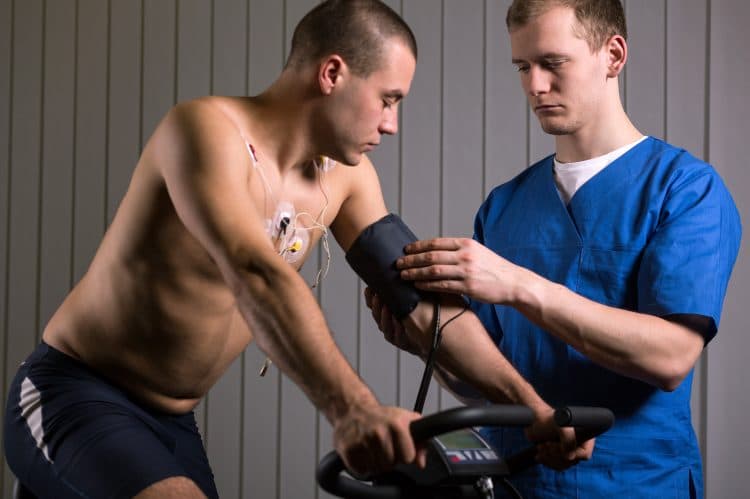So what is water fasting?
Water-only fasting is a restrictive diet. You consume nothing besides water on this diet. Water fasting is also a zero-calorie diet. You consume no calories while fasting [1]. Don’t confuse water-only fasting with a liquid diet. Liquid diets allow other calorie-containing liquids.
Many people use a water-only fast for weight loss in diet culture. However, many potential risks can arise from following a zero-calorie diet. Water-only fasting offers many other benefits when done under medical supervision.
How to Do a Water-Only Fast
Doing a water-only fast is simple. You strictly drink only water for the duration of your fast.
No standard guidelines exist for the duration of a water-only fast. The general guideline recommends not fasting for longer than 72 hours. Fasting longer than 72 hours may cause risks to outweigh any potential benefits. Complete water-only fasting longer than 72 hours under medical supervision.
Individuals can drink as much water as needed to remain hydrated during a water-only fast. No restrictions on water intake exist. The current recommendation is two to three liters of water every day for individuals while water-only fasting [1].
You can drink regular filtered water when fasting. One study recommends drinking mineralized water [1]. Mineralized water helps your body maintain mineral balance. It can also help avoid mineral imbalance while fasting [1].
Completing a water-only fast is a simple task. Ending a water-only fast requires more careful consideration. Avoid large, heavy meals when ending your fast. This can increase your risk of refeeding syndrome. Slowly transition your body back to eating instead. You could start with bone broth or juice and then move on to a small light meal. Increase your food intake gradually from there until your body feels adjusted.
Water Fasting Benefits
Weight Loss
Weight loss is the most noticeable change people experience due to water-only fasting [1].
A decrease in caloric intake and a state of ketosis correlate with weight loss as a result of water-only fasting.
The USDA Dietary Guidelines for Americans recommend calorie intake between 1,800 to 2,400 per day for females and 2,400 to 3,000 per day for males [2]. Use a calorie calculator to calculate your daily caloric needs.
Reducing your daily caloric intake by approximately 500 calories can cause weight loss. This reduction puts you in a caloric deficit [3, 7].
Your body can enter a state of ketosis 12 to 36 hours after beginning a fast. Ketosis means your body burns fat for energy instead of glucose [4, 5]. Burning fat for energy leads to fat loss [5].
Many studies found water-only fasting significantly reduces weight and BMI for five to eleven days [1, 8, 9, 12].
One study showed participants lost an average of 4.59 kilograms of body weight. They also had a 9.85-centimeter reduction in waist circumference after completing a five-day water-only fast [8].
Another study found weight loss averaging 0.9 kg/day during the first week of a water-only fast [12]. The weight loss rate decreased to 0.3 kg/day by the third week of fasting [12].
Many studies reported participants’ weight and waist circumference remained lower even after a refeeding period [8, 9, 12]. This sustained weight loss suggests water-only fasting as a potential approach to sustainable weight loss.
Maintained Protein Balance
People complete water-only fasting for a short duration. There is no concern for muscle loss during this time. The metabolic changes occur during fasting. These changes prevent muscle breakdown. The body utilizes fat for energy during this time [13].
Multiple studies found protein reserves were maintained during fasting [1, 12, 13].
Blood Pressure Regulation
Many studies concluded water-only fasting significantly reduces blood pressure for 5 to 11 days [7, 8, 9, 10, 11, 12].
One study found 90% of participants experienced significant systolic and diastolic blood pressure reductions after 11 days of water-only fasting [7]. Researchers measured the average reduction at 37/13 mm Hg [7]. People with hypertension experienced greater reductions of 60/12 mm Hg [7]. Every participant taking medication during the study discontinued their medication [7].
Water-only fasting may be an effective and safe means of regulating blood pressure and reversing hypertension under medical supervision.
Increased Immunity
Water-only fasting may increase immunity.
One study found participants experienced a reduction in perceived stress after fasting for eight days [1]. Perceived stress, also known as acute stress, can impair immune response [1]. Stress reduction can have a therapeutic impact. Stress reduction activates cell regeneration. Stress reduction also produces a strong immune response [1].
Blood Sugar Management
Water-only fasting may also improve blood sugar regulation. It may also be an effective treatment for insulin resistance [8, 12].
Water Fasting Risks
Mineral Imbalance
Mineral imbalance is a concern with water-only fasting. Minerals become depleted during prolonged fasting [1, 13].
Your body relies on minerals for many reasons. Minerals balance water. They balance pH levels. They move waste out of cells and bring nutrients in. Minerals support nerve, muscle, and heart functions [17].
You can find minerals in food. Sodium, calcium, potassium, phosphate, magnesium, and chloride are a few examples [17]. You no longer consume food when fasting. These minerals become depleted during this time [17].
Drinking mineral water may help avoid mineral imbalance when water-only fasting [1].
Nausea, headaches, fatigue, and confusion are symptoms of mineral imbalance [1].
Refeeding Syndrome
This risk is associated with water-only fasting. The risk occurs during refeeding, not the fasting period. Anyone who fasts for over five days is at risk of refeeding issues [13].
Refeeding syndrome is a potentially fatal condition. Refeeding syndrome results from overeating after an extended period of fasting [13].
Intracellular minerals become depleted during prolonged fasting (over five days) [13]. The body switches its primary energy source from glucose to fat during fasting [13]. Insulin usage slows down. The body no longer needs insulin to convert glucose into energy [13]. Electrolytes help convert glucose into energy, but not fats. Electrolytes become depleted quickly during a water-only fast.
The body quickly switches back to converting glucose into energy when you eat after a prolonged duration of fasting [13]. This switch causes a drastic metabolic shift. The shift causes a spike in insulin secretion. The spike occurs because there are no electrolytes to maintain function [13].
Signs and symptoms of refeeding syndrome include:
- Weakness
- Confusion
- Difficulty breathing
- High blood pressure
- Seizures
- Heart failure
- Coma
- And, even death
Reintroduce food slowly after fasting. Consume light, low-calorie foods. This allows your body time to adjust without going into shock.
Elevated Blood Sugar
Many studies found blood sugar spiking during refeeding, even without refeeding syndrome. Metabolic changes occur during refeeding. These changes can result in hypoglycemia [1, 12].
Kidney Function
Prolonged water-only fasting can affect kidney function. It can cause decreased renal function. Prolonged water-only fasting can also increase uric acid levels in the blood [1, 8, 9].
Hyperuricemia is the most common effect of impaired kidney function. Hyperuricemia is an elevated level of uric acid in the blood [1, 9]. Hyperuricemia can lead to gout and kidney stones.
Doctors do not recommend water-only fasting for individuals with impaired renal function or gout [8].
Eating Disorders
Fasting may increase the risk of developing eating disorders. Fasting can increase a preoccupation with food avoidance and body weight [14, 15].
Water-only fasting is a very restrictive fast. It can put people at risk for anorexia [14, 15].
Water-only fasting has many restrictions. These restrictions may increase the risk of binging during refeeding. This could cause refeeding syndrome. Restrictions may also increase the risk of a binge-purge cycle [13, 14, 15].
Avoid water-only fasting if you have an eating disorder. Also, avoid water-only fasting if you are at risk of developing an eating disorder.
Subjective Symptoms
Some people experience symptoms during water-only fasting. These symptoms may not lead to serious risks.
Subjective symptoms include [1, 9, 10, 11]:
- Dehydration
- Hunger
- Headaches
- Nausea
- Vomiting
- Irritability
- Kidney pain (back pain)
- Foul taste in the mouth
- Insomnia
- Fatigue
Other Cautions
A great level of concern exists for certain individuals participating in water-only fasting. These individuals should avoid water-only fasting: people with poor renal functioning, people with eating disorders, underweight individuals, pregnant women, breastfeeding women, and people taking medications [16].
Learn everything about fasting
- Anabolic Fasting: Learn About Building Muscle and Losing Fat Simultaneously
- I'm a Fasting Expert: This is the One Mistake That Destroys Fat Loss During IF
- Inflammation Calculator & Personalized Action Plan
- Dry Fasting Calculator: Estimate Your Weight Loss & Safety Risks
- Intermittent Fasting Weight Loss Calculator: Discover How Much You Can Lose
- Intermittent Fasting vs. Small Meals: Which is Best for Weight Loss?
- 8 Intermittent Fasting Mistakes Beginners Make (And How to Avoid Them)
- I Stuck to an 8-Hour Eating Window for 3 Weeks — Here’s What Happened
FAQs About Water Fasting
How long can you safely do a water-only fast?
Limit water-only fasts to a maximum of 3 days unless you have medical supervision.
Is weight loss possible with water-only fasting?
Yes, water-only fasting can cause weight loss. You create a caloric deficit by abstaining from food.
Does drinking water break a fast?
Fasting involves abstaining from food and caloric beverages for at least 12 hours. Drinking water does not break a fast.
Wrapping Up
Water-only fasting offers scientifically backed benefits. Blood pressure regulation and weight loss are two of these benefits. Many risks are also associated with water-only fasting. Do not complete water-only fasting for longer than 72 hours without medical supervision. Medical professionals can monitor mineral levels in your blood and urine during a fast. This monitoring helps ensure that fasting is not causing harm. Many effects of water-only fasting are not immediately visible. Medical professionals can detect issues before symptom onset.
End your fast and seek medical advice if you experience unfavorable symptoms.
References
Fitness Volt is committed to providing our readers with science-based information. We use only credible and peer-reviewed sources to support the information we share in our articles.
- Ogłodek, E., & Pilis, Prof., W. (2021). Is Water-Only Fasting Safe? Global Advances in Health and Medicine, 10, 216495612110311. https://doi.org/10.1177/21649561211031178
- U.S. Department of Agriculture and U.S. Department of Health and Human Services. Dietary Guidelines for Americans, 2020-2025. 9th Edition.
- Koliaki, C., Spinos, T., Spinou, A., Brinia, A. E., Mitsopoulou, D., & Katsilambros, N. (2018). Defining the Optimal Dietary Approach for Safe, Effective and Sustainable Weight Loss in Overweight and Obese Adults. Healthcare, 6(3), 73. https://doi.org/10.3390/healthcare6030073
- Anton, S. D., Moehl, K., Donahoo, W. T., Marosi, K., Lee, S. A., Mainous, A. G., Leeuwenburgh, C., & Mattson, M. P. (2017). Flipping the Metabolic Switch: Understanding and Applying the Health Benefits of Fasting. Obesity, 26(2), 254–268. https://doi.org/10.1002/oby.22065
- Collier, R. (2013). Intermittent fasting: the science of going without. Canadian Medical Association Journal, 185(9), E363–E364. https://doi.org/10.1503/cmaj.109-4451
- Redman, L. M., & Ravussin, E. (2011). Caloric Restriction in Humans: Impact on Physiological, Psychological, and Behavioral Outcomes. Antioxidants & Redox Signaling, 14(2), 275–287. https://doi.org/10.1089/ars.2010.3253
- Goldhamer, A., Lisle, D., Parpia, B., Anderson, S. V., & Campbell, T. (2001). Medically supervised water-only fasting in the treatment of hypertension. Journal of Manipulative and Physiological Therapeutics, 24(5), 335–339. https://doi.org/10.1067/mmt.2001.115263
- Jiang, Y., Yang, X., Dong, C., Lu, Y., Yin, H., Xiao, B., Yang, X., Chen, W., Cheng, W., Tian, H., Guo, L., Hu, X., Fang, H., Chen, W., Li, Z., Zhou, W., Sun, W., Guo, X., Li, S., . . . Jia, L. (2021). Five-day water-only fasting decreased metabolic-syndrome risk factors and increased anti-aging biomarkers without toxicity in a clinical trial of normal-weight individuals. Clinical and Translational Medicine, 11(8). https://doi.org/10.1002/ctm2.502
- Mojto, V., Gvozdjakova, A., Kucharska, J., Rausova, Z., Vancova, O., & Valuch, J. (2018). Effects of complete water fasting and regeneration diet on kidney function, oxidative stress and antioxidants. Bratislava Medical Journal, 119(02), 107–111. https://doi.org/10.4149/bll_2018_020
- Gustafson, C. (2014). Alan Goldhamer, dc: Water Fasting-The Clinical Effectiveness of Rebooting Your Body. Integrative medicine (Encinitas, Calif.), 13(3), 52–57.
- Finnell, J. S., Saul, B. C., Goldhamer, A. C., & Myers, T. R. (2018). Is fasting safe? A chart review of adverse events during medically supervised, water-only fasting. BMC Complementary and Alternative Medicine, 18(1). https://doi.org/10.1186/s12906-018-2136-6
- Scharf, E., Zeiler, E., Ncube, M., Kolbe, P., Hwang, S. Y., Goldhamer, A., & Myers, T. R. (2022). The Effects of Prolonged Water-Only Fasting and Refeeding on Markers of Cardiometabolic Risk. Nutrients, 14(6), 1183. https://doi.org/10.3390/nu14061183
- Mehanna, H. M., Moledina, J., & Travis, J. (2008). Refeeding syndrome: what it is, and how to prevent and treat it. BMJ, 336(7659), 1495–1498. https://doi.org/10.1136/bmj.a301
- Stice, E., Davis, K., Miller, N. P., & Marti, C. N. (2008). Fasting increases risk for onset of binge eating and bulimic pathology: A 5-year prospective study. Journal of Abnormal Psychology, 117(4), 941–946. https://doi.org/10.1037/a0013644
- National Institute of Mental Health. (n.d.). Eating Disorders. National Institute of Mental Health (NIMH). https://www.nimh.nih.gov/health/topics/eating-disorders
- Mayo Clinic. (2020, December 4). Fasting diet: Can it improve my heart health? https://www.mayoclinic.org/diseases-conditions/heart-disease/expert-answers/fasting-diet/faq-20058334
- MedlinePlus. (n.d.). Fluid and Electrolyte Balance. https://medlineplus.gov/fluidandelectrolytebalance.html













